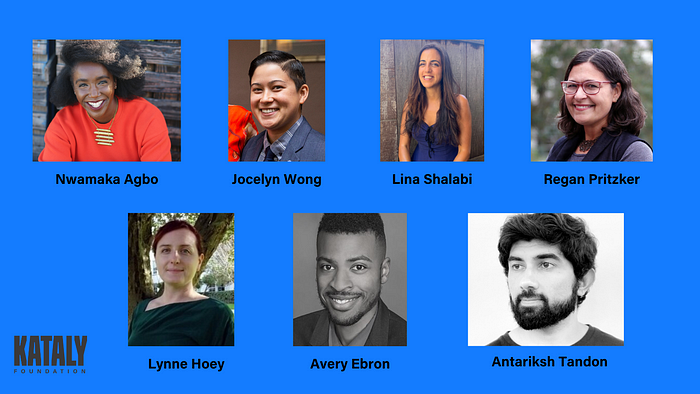Transforming Investment to Build Community Wealth: A Conversation with the Restorative Economies Fund
On Wednesday, November 10, the Restorative Economies Fund (REF) team at the Kataly Foundation hosted a webinar to discuss how to use capital as a tool for liberation and create shared prosperity instead of individual wealth. The team shared the framework of restorative economics, the Foundation’s integrated capital approach, and what it means to build community wealth.

The REF team was joined by our grantee partners Antariksh Tandon and Avery Ebron with The Guild, who shared the organization’s vision for their first community-owned and -stewarded property. The project will be a development owned and governed by its residents and will include a locally-sourced grocery, a shared kitchen space for Black restaurateurs, and housing. During the webinar, Antariksh and Avery shared how they centered the needs of impacted community members in their process, and how patient capital and non-extractive loans made that process possible.
Read on for some key insights and watch the full video of the webinar below if you missed it.
Introduction by Nwamaka Agbo, CEO of the Kataly Foundation and Managing Director of the Restorative Economies Fund: 00:05
Introductions by the Restorative Economies Fund team: 8:00
- Nwamaka Agbo, CEO of Kataly and Managing Director of the Restorative Economies Fund
- Lynne Hoey, Chief Investment Officer
- Jocelyn Wong, Director of Capacity Building at Kataly, Analyst for the Restorative Economies Fund
- Regan Pritkzer, Board Chair
- Lina Shalabi, Executive Assistant
What is Restorative Economics?: 18:45
What is Integrated Capital? 23:15
What is community wealth building? 29:45
Panelist discussion: 38:00
- Facilitator: Jocelyn Wong Director of Capacity Building at Kataly, Analyst for the Restorative Economies Fund
- Antariksh Tandon, Development and Design Director, The Guild
- Avery Ebron, Head of Community Product, The Guild
- Lynne Hoey, Chief Investment Officer, Kataly Foundation
Q&A and Closing: 1:20:00
If you are interested in a part 2 from the REF team that delves further into the weeds, let us know.
Key learnings and reflections from the webinar:
On the questions philanthropy needs to grapple with:
“What if funders fully prioritized the impact on Black and brown communities over financial returns in our investment decisions? What if all of us in philanthropy were actually ready to invest in Black and brown communities by centering their needs and addressing their concerns? What would that look like?” — Nwamaka Agbo
On what it means to Kataly to be a practice-based funder:
“To us, being a practice-based funder is important because it means that our program team members come out of a unique lived and movement experience of the programs that they work on. They understand what it fundamentally takes to do the work on the ground.” — Nwamaka Agbo
On the problems with taking a bare minimum approach in philanthropy:
“Trickle-down economics does not work and neither does trickle-down philanthropy.”
“Foundations meant to exist in perpetuity — doling out just 5% of the corpus annually for grantmaking — just isn’t going to cut it. This bare-minimum approach has stoked competition and a scarcity mindset within social movements, and it is what has kept our communities hamstrung in addressing the most pressing crises of our time.” — Jocelyn Wong
On building agency and power in community:
“The way real estate works isn’t working, especially for Black and brown communities. Business and residents are being rapidly displaced by a system that’s focusing on profits, not people. Folks really aren’t given a stake. What we really wanted to do was take power away from the corporations and investors without a stake but who were making all the decisions, and impart that [power] upon the community residents who create and love the places where they live.” — Avery Ebron
On creating a community of investors grounded in solidarity and justice:
“As this work is meant for people who are characterized by the system as non-accredited investors, we will be doing a series of education programs. So financial and investment education required by the SEC rules, but always undergirding that will be a political education imparting what the political agenda behind all of this work is around decommodification of housing, and around land ownership more broadly speaking. The ideals and principles are embedded in there so it’s not just, ‘hey here’s how to be an investor’, but here’s what it means to be an investor, here’s how you could use it to be in solidarity with other people in the neighborhood.” — Antariksh Tandon
On redefining what risk means:
“We center community risk first and foremost in our due diligence process and that really means: what is the risk of this project not happening for the community?
When you approach it from, ‘what are we actually losing to not do this investment?’ that’s a completely different frame to diligence. It centers the people who have been the most impacted.” — Lynne Hoey
On having honest conversations with funders about the source of their money:
“It can feel a little like the third rail, can you talk to funders about the source of their money? And I think it’s really important to de-stigmatize or decolonize that idea. There’s no denying that philanthropy exists as a symptom of an extractive economic system.
Dollars that are intended theoretically for social good are taken out of the public system through taxation and kept in the private control of the wealthy elite who felt, at best, that they could better determine where those dollars should go, and, at worst, as a way to wield control over the population that they wanted to serve.
So that’s where my money comes from, whether it’s high-end hotels or very efficient tax strategies that have allowed intergenerational wealth to be a possibility across more than three generations in my family. Those are very structural systems that are built to create inequality. So thinking that philanthropy is somehow a place where equality happens in the current system is kind of like saying public education is going to be just inside of a country that is experiencing racism. You can’t make that assumption.” — Regan Pritzker
Further reading and resources:
- More about the work of The Guild
- Nwamaka Agbo’s piece on the framework of Restorative Economics in Nonprofit Quarterly.
- The Kataly Foundation’s Funder Readiness Checklist, a document created to support philanthropic institutions who have expressed an interest in moving towards an integrated capital approach.
- Jocelyn Wong’s piece on practice-based philanthropy.
- Nwamaka Agbo’s post in Center for Effective Philanthropy on philanthropy’s responsibility to movements.
We hope you will also follow the #LetsTalkPower conversation on Twitter.
We will be co-hosting a Twitter chat with our partners at Solidaire Network and Justice Funders on December 1 at 10 am PST/1 pm EST where we will be amplifying perspectives from our grantee partners about how philanthropy can do things differently and align itself with racial justice values and practices.
